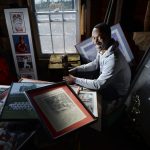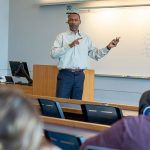For the past six years, I have taught a college course on sports and social justice, starting at my alma mater, the University of Pennsylvania, and then at Yale University and currently, at the University of Connecticut. Inspired by topics that were targeted by the “stick to sports” mantra, the class was an opportunity to engage the next generation on the intersection of sport and society. It has been shaped by and vetted through years of academic research, current events, personal experience, and student feedback.
Glanville has no trouble expressing his views on baseball or on any other subject that interests him, which serves him well as a sports commentator for ESPN and NBC Sports Chicago, a writer for The Athletic, the Times and other publications, and an adjunct professor at the University of Connecticut Neag School of Education.
When Neag School of Education professor Doug Glanville cleaned out his garage during a recent family move, he unearthed some unusual stuff. Interspersed among the old grill equipment and lawn chairs were a dozen baseball bats, signed by Derek Jeter and other MLB stars, and beneath them a pair of Nike spikes that once belonged to Michael Jordan, during his year of professional baseball.
When Neag School of Education professor Doug Glanville cleaned out his garage during a recent family move, he unearthed some unusual stuff. Interspersed among the old grill equipment and lawn chairs were a dozen baseball bats, signed by Derek Jeter and other MLB stars, and beneath them a pair of Nike spikes that once belonged to Michael Jordan, during his year of professional baseball.
The nine-year MLB veteran joined SportsJam host Doug Doyle to talk about the new show, his baseball and broadcasting career, social justice matters, and his days at Teaneck High School. The baseball analyst, writer, author and educator who teaches classes at UConn’s Neag School of Education spoke on a Zoom chat from his home in Bloomfield, Connecticut.
I knew what it meant to be a Black man in America well before I was a parent, before I found out that shoveling my own driveway involves risk, that buying a house brings the potential of lowering property values, that signing up my kids for an education involves countering forces that erode their self-esteem — when schools are still largely segregated and security officers are summoned disproportionately to deal with Black students. But knowing these things now, how can I leave all that at the door?
“As long as I have those existential questions, particularly while my kids are young, I will be a hesitant candidate,” says Doug Glanville, a former MLB player, and current Neag School faculty member. “Admitting that, I wouldn’t fault anyone for not considering me. But I still believe the game can help make the world better — for all of our children — even as I choose to cheer from afar.”
Kiplinger contributor (and former Major League Baseball player) Doug Glanville shares insights from years playing the game — and investing.
“It is an opportunity for baseball to give back, not only in a way to entertain, but to bring us back to a place of engagement as a team. Although baseball is non-essential, what we’re missing is that spirit of team and we could use that not only on the field, but also for our country and to figure out how we can address these issues in our country,” Glanville said.
“As we await a potential agreement between MLB ownership and the union to play the 2020 season, there is still a long bridge to cross between policy and reality,” says Doug Glanville, a Neag School faculty member and former MLB player. “In the end, it is a negotiation, and history tells us there must be a compromise if there’s going to be baseball this year. During this coronavirus pandemic, safety has no compromise, of course, but there are elements on the table that leave more room to meet in the middle.”


